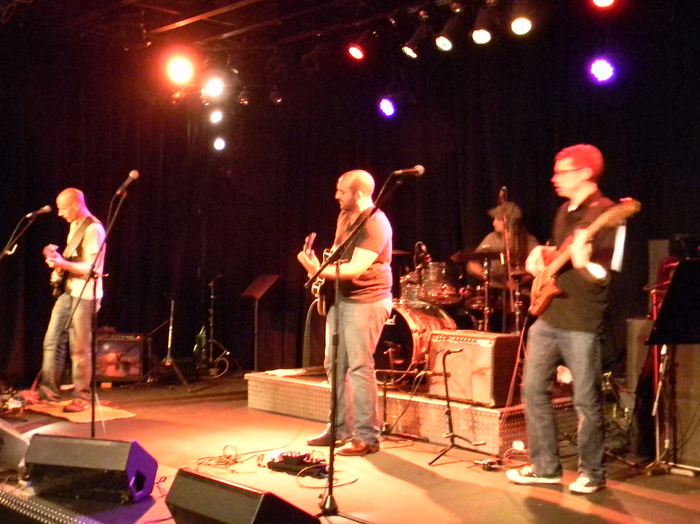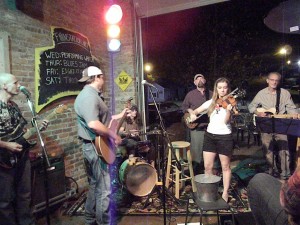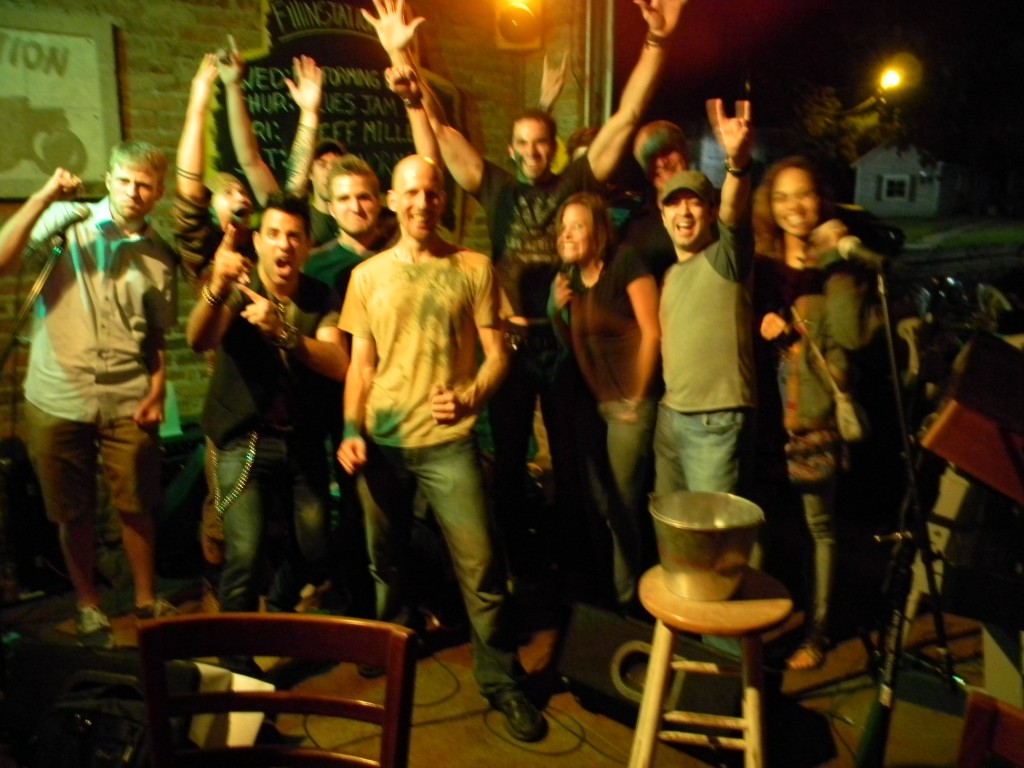studio
The Nashville Berklee Jam presents “Inside the Nashville Music Industry” with Eric Normand and Mike Chapman – August 26, 2013
As host of the Nashville Berklee Jam, the job of booking special guests at this bimonthly event has been an interesting one. The Nashville music industry is chock full of music industry insiders and this fact has yielded some great talks for us over the past year and half. During this time, I’ve been asked a few times to give one of these talks and on Monday, August 26 I decided to share my perspective. Earlier that month I had given an in-depth clinic about the Nashville music industry at the Berklee College of music in Boston, so a continuation of that theme seemed like the logical thing to do. I decided to take it one step further and enlisted the help of my friend and colleague, A-list session bassist, Mike Chapman.
I spoke first, giving a talk that was essentially an overview of the Nashville music industry. Much of this “street level perspective” of the music related jobs in Nashville was basically a condensed version of my book “The Nashville Musician’s Survival Guide”. After my talk, Mike gave a talk which covered some finer points about the recording industry side of Music City. Rather than elaborating on these discussions in a blog, I thought it would be more beneficial to simply share the following videos of these talks (special thanks to Jack Zander for filming, editing and posting the videos). For a different perspective, you can also check out this blog written by Berklee alum, Amanda Williams.
So here you go, videos of our talks and a few performances!
The Nashville Berklee Jam is held at The Rutledge on the last Monday of every other month, with the next event to take place on Monday, October 28 with special guest, performance coach, Diane Kimbrough. After Diane’s talk, she will be sticking around and offering free critiques and coaching to performers and jammers. Please e-mail me if you would like to take part in this part of the event. Or just show up and let me know that you are interested in participating, we’ll do our best to squeeze you in!
For more info about future events, please visit the Nashville Berklee Jam website NashvilleBerkleeJam.com
If you would like to learn more about the Nashville music industry, please check out my website and book “The Nashville Musician’s Survival Guide”.
Dave Pomeroy at the Nashville Berklee Jam, June 24, 2013: Videos
Here’s the videos of Dave Pomeroy speaking at our June Nashville Berklee Jam, plus a video of Dave performing one of his original tunes “Old Friends”. Video courtesy Jack Zander.
Dave Pomeroy Talk – Building a Career in a Changing Music Industry – Part 1
Dave Pomeroy Talk – Building a Career in a Changing Music Industry – Part 2
“Old Friends” – performed by Dave Pomeroy
The Nashville Berklee Jam is held at The Rutledge on the last Monday of every other month, with the next event to take place on Monday, October 28 with special guest, performance coach, Diane Kimbrough.
For more info about future events, please visit the Nashville Berklee Jam website NashvilleBerkleeJam.com
If you would like to learn more about the Nashville music industry, please check out my website and book “The Nashville Musician’s Survival Guide”.
A-list bassist and Union President, Dave Pomeroy speaks at the Nashville Berklee Jam; June 24, 2013
by Eric Normand
Long before recording with artists like Emmy Lou Harris, Alison Krauss, and Peter Frampton, Nashville Musicians Union President and our guest speaker on this night, Dave Pomeroy was learning how to play the standup bass in a school orchestra in Virginia. Growing up as the son of a military man, Dave experienced life in a few different places and also learned how to play the electric bass before eventually permanently relocating to Nashville in 1977. Following a musical heart inspired by the British Invasion, his foray into the world of the fretless bass would eventually come full circle when his skills landed him session work with Keith Whitley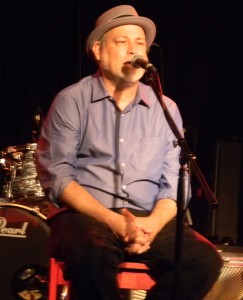 and Trisha Yearwood many years later.
and Trisha Yearwood many years later.
The road that led to A-team session work in the Nashville studio scene of the 80’s and 90’s was filled with a plethora of life and music enriching experiences. Working with the legendary Don Williams from 1980 to 1994 was a “journey into minimalism” which ultimately taught him the power of the song. Under the wing of this world-class songwriter and performer, Dave learned how to become a great songwriter, studio musician and producer in his own right.
“Don changed my life… these are all things he taught me, just by example and by encouraging me and giving me respect…”
A key moment in Dave’s life came 10 days after he finished recording on Keith Whitley’s fourth album, when the legendary singer died suddenly of an alcohol overdose.
“…It really shook me up and I realized that I was not at a good place in my life, I needed to change some things and make myself a happy person…it really did change my life and made me realize that life is precious and you better get on with what you’re trying to do…”
Dave continued on as an in-demand session player, his work with Keith Whitley ultimately leading to recording the bass tracks on Trisha Yearwood’s first seven albums as well as countless other major-label projects.
“One of the lessons that I really want to impart is that you have to listen to your inner voice when it talks to you, because if you don’t, it will stop talking…”
He joined the Nashville Musicians Union, AFM Local 257 in 1978, gradually becoming more and more involved in the years that followed. As the years rolled by he became frustrated with the status quo of the Union, feeling there was a growing “disconnect between players and leadership”. In 2008 he ran for union president and won the election. Dave shared that the Musicians Union has totally changed, both here and nationally and spoke about its role in regards to the rights of the individual musician.
“It’s really about trying to spread the word that it’s okay to take care of business, and not all musicians are good at that…in this day and age, if you don’t protect yourself who’s going to? If the Musicians Union doesn’t have your back, it’s you against the music business, good luck with that, it works for some people, but at the same time it’s good to know that there are resources and that you do have something you can fall back on.”
One of his roles as union president is fighting for musician and songwriter rights to be paid for their work, and the reality of digital piracy.
“We’ve been through this terrible thing with digital piracy… it really just decimated the way things were. But now we’re starting to see that people are actually understanding that it’s not that big of a deal to spend $1.29 or $.99 to buy a song instead of stealing it, and that if you want to have a music business in the future it may not be there if you’re not willing to pay for stuff…it’s okay to be a consumer, it’s okay to be a fan, I’m still a fan.”
Near the end of Dave’s talk he shared a few pieces of advice one can only learn from a lifetime of pursuits in the music business:
- Take nothing for granted
- Don’t be afraid to ask questions
- There are no stupid questions
- Strive to play with players who are better than you
- Be honest with yourself
- Be a nice person, nobody wants to work with a jerk
- Don’t take it personal if you don’t get the call
- Owning your own stuff is the way of the future
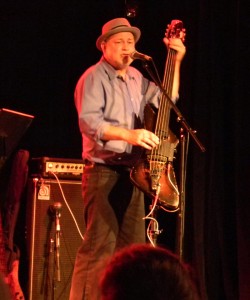 After some questions and answers Dave played a brief set of original solo material using a very unique approach. Tying into his theme of “individual entrepreneurship in a changing music scene” he used two basses, one on a stand and one he wore around his neck to create loops on the fly using a loop machine. He then sang tunes over the loop accompanying his performance on the second bass by playing secondary parts, fills and solos. It was an inspired performance that everyone seemed to thoroughly enjoy.
After some questions and answers Dave played a brief set of original solo material using a very unique approach. Tying into his theme of “individual entrepreneurship in a changing music scene” he used two basses, one on a stand and one he wore around his neck to create loops on the fly using a loop machine. He then sang tunes over the loop accompanying his performance on the second bass by playing secondary parts, fills and solos. It was an inspired performance that everyone seemed to thoroughly enjoy.
His portion of the night concluded, and the open jam began featuring a combination of Berklee alumni and others from the Nashville music community. The jam covered a lot of ground, everything from blues jams to original songs by some up-and-coming Nashville songwriters.
I would like to extend a big thank you to Dave Pomeroy for sharing his wisdom and music, Jack Zander for videotaping this event, The Rutledge, Berklee alumni volunteers Shantell Ogden, Heston Alley, Blake Branch, and everyone else who came out for this event. See you at the next one!
The Nashville Berklee Jam is held at The Rutledge on the last Monday of every other month, with the next event to take place on Monday, August 26 when I will be giving a talk about navigating the Nashville Music Industry
For more info about future events, please visit the Nashville Berklee Jam website NashvilleBerkleeJam.com
If you would like to learn more about the Nashville music industry, please check out my website and book “The Nashville Musician’s Survival Guide”.
Nashville Berklee Jam with Dallas Davidson – February 18, 2013 – Part II
By Eric Normand
We were only halfway through our very first Nashville Berklee Jam at The Rutledge and those in attendance had received some amazing perspective, and enjoyed an inspired performance from one of Nashville’s top songwriters, Dallas Davidson. After Dallas’s portion of the night was 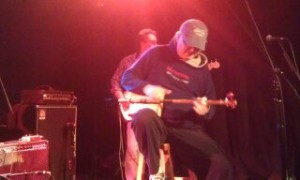 over we took a moment to reorganize and then began the open jam portion of this night.
over we took a moment to reorganize and then began the open jam portion of this night.
Among those who performed were alums, Amanda Williams (also one of the organizers of this event), Mason Stevens, who played a Delta blues instrument known as the “Diddly Bo”, drummers, John Rodrigue and Russell Garner, and bassist, Austin Solomon (Austin took a means solo in Cissy Strut). A few others from the Nashville music community also sat in on drums, Austin Marshall and Tom Drenon.
All the performances were strong and everyone who participated had a great time, but don’t take my word for it, check out the videos below to get a better idea of what can happen at The Nashville Berklee Jam!
The Nashville Berklee Jam is held at The Rutledge on the last Monday of every other month, with the next event to take place on Monday, April 29 featuring special guest, Bassist, Bryan Beller (Joe Satriani, Steve Vai, Mike Keneally) who will also be joined by his wife, Kira Small.
For more info about future events, please visit the Nashville Berklee Jam website NashvilleBerkleeJam.com
If you would like to learn more about the Nashville music industry, please check out my website and book “The Nashville Musician’s Survival Guide”.
Rhett Akins: Hit Writer, Small Town Swagger
Our most recent Nashville Berklee Jam featured hit songwriter and country music artist, Rhett Akins as the guest speaker and performer. The Georgia native and member of the red hot songwriting team, “The Peach Pickers” is currently one of Nashville’s hottest songwriters, and his talk focused on just about every aspect of that world you could imagine. Working with Rhett as his tour manager, bandleader, and lead guitarist for the last seven years has given me some great perspective on what goes on in the world of a Nashville songwriter. And on this comfortable late summer night he gave the crowd of alums and locals at the Fillin’ Station a real peek behind the curtain into that otherwise secret society. Rhett preceded and followed his talk by performing some of his most recent mega-hits with two members of the alumni house band (Heston Alley on drums and me on guitar) and two other members of his touring band – session aces and former “G-men”, Mike Chapman on bass and Chris Leuzinger on guitar. Rhett also invited fiddle player/singer and Berklee alum, Michel Lambert to the stage to perform some classic country and bluegrass. Today’s guest blog post about this event was written by performing writer and fellow Berklee alum, Shantell Ogden ’05. Here’s her recap of this great talk:
Rhett Akins: Hit Writer, Small Town Swagger – by Shantell Ogden
After twenty years in the music industry in Nashville, there isn’t much that Rhett Akins hasn’t seen. He stopped by our recent Berklee College of Music alumni event (hosted by Eric Normand) to share some of his experience as an artist and songwriter.
The early days…
Rhett described music itself as his biggest motivator as a kid. He said he “always had his head between speakers” and joked that he listened to the 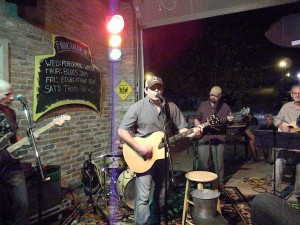 Kiss Alive II album so much that he probably knows “every sound on that record.”
Kiss Alive II album so much that he probably knows “every sound on that record.”
“Not having access to music at all times made me love it more,” he said. “We didn’t have iPods back then so you had to make the effort to buy and listen to it.”
Rhett said his early songs were very personal. “I would write songs in deer blinds about girls back in high school. Back then, I was just writing what I knew and what was true to me.”
Rhett first came to Nashville with his grandpa who knew an entertainment lawyer through a family connection. Through this connection, Rhett met John Jarrard, a hit songwriter in town. John was blind and counted the steps from his home to his Music Row office to write each day.
“I guess he liked me and thought I had potential,” said Rhett. “We started writing songs together and I learned a lot from him.”
Not long after, Paul Worley signed both Rhett and Terri Clark to Sony/ATV publishing as writers and artists. Rhett was with Sony from 1993 to 1996. [Note: He didn’t have a publishing deal for 10 years (because he was writing songs for himself as an artist). He signed a co-publishing deal with EMI in 2006, and since EMI was purchased he now writes for Sony again.]
Rhett admits that in his early career, the biggest mistakes he made were in trusting people on a handshake, like he had in his hometown in Georgia.
“I’m really glad that my granddad and our lawyers were smart enough not to lock us into lifetime contracts,” said Rhett. “Those contracts cost a lot of bands a lot of money to get out of.”
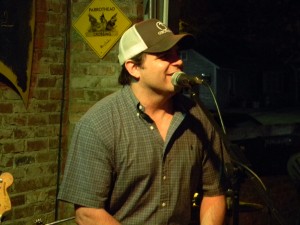 He said that sometimes speaking his mind has also been a mistake, but that’s not something he regrets much. Even though some choices weren’t the best for his career, they were the best for the music he was creating.
He said that sometimes speaking his mind has also been a mistake, but that’s not something he regrets much. Even though some choices weren’t the best for his career, they were the best for the music he was creating.
Pinch me moments…
When asked about some of his career ‘pinch me moments’ Rhett said there were a lot of them. Here are a few he mentioned:
• When he was 22, Rhett was sitting in Donna Hill’s office when the phone rang and she said, “Hang on a minute, it’s Conway.” Rhett was a huge Conway Twitty fan, and could hear his idol’s voice on the phone.
• He was at the AMA awards one year sitting between LL Cool J and The Smashing Pumpkins.
• Hank Williams Jr. recorded one of his songs, “Thirsty,” on an album he did in 2010.
• He toured with Reba and was on the David Letterman show.
Nowadays…
Rhett said he’s evolved as a writer in how he writes and where the ideas come from.
“When you write over a 100 songs a year, you start pulling ideas from anywhere and everywhere,” he said. “I still want to write what’s true, it just might be someone else’s story.”
And sometimes he even has a specific artist in mind when he’s working on a song.
“When we were writing ‘Honeybee’ the chorus came first,” he said. “We knew that the verses had to be a little crazy because a girl would just laugh if a guy actually said, ‘you be my little Loretta, I’ll be your Conway’ and the other lines in the chorus. Ben [Hayslip] and I were thinking about Blake Shelton for it because he has the sense of humor to pull off a song like that.”
“Honeybee” became a number one Billboard hit for Blake, making it just one of the songs that Rhett and the other Peach Pickers (Dallas Davidson and Ben Hayslip) have written in recent years.
So, what is a writing session like with the Peach Pickers?
“We are really laid back about it,” said Rhett. “We usually get together around 11:00 every Wednesday and talk about hunting and sports for a bit. We eat lunch and then usually someone has an idea to work on. If we don’t finish it that week, we get to it again the next week.”
Dallas and Rhett are usually thinking about the music, while Ben is more focused on lyrics. The three have written so much together they’ve built up a lot of trust.
“We tell each other when we don’t like something, and sometimes we think the songs should go in different directions,” said Rhett.
Despite all of his success, Rhett is quick to point out that the music industry and which songs get cut is still a mystery to him.
“I don’t understand why some songs suck and somehow they become a hit, while other songs you think are hits never make it,” he said. “I just show up everyday because you never know when the magic is going to happen.”
Rhett likes being a songwriter because writers don’t have the pressure of radio that artists do and “you can write 10 bad songs and not worry about it, but an artist can’t record too many bad songs in a row if they want a career.”
Rhett isn’t afraid to cross genres as a writer. He recently collaborated on some rap music with T-Pain and said that in his view the new era of country is really headed musically in a more rock/pop/hip-hop direction.
Accomplishments aside, you can’t help but want to shoot the breeze with Rhett. He’s got a laid-back small town swagger, and he isn’t afraid to be who is his.
For more information on Rhett, visit his website. For more information on monthly Berklee alumni events in Nashville, visit Nashville Berklee Jam (events are free and open to the public). To view the original blog post and other music industry articles by Shantell, please visit her website at www.shantellogden.com. If you’re interested in reading a in-depth interview with Rhett about songwriting, check out “The Nashville Musician’s Survival Guide” by Eric Normand
Nashville Berklee Jam with Rich Redmond – June 5, 2012
The latest Nashville Berklee Jam last Tuesday was a great success, thanks to all who attended! The weather was beautiful, so we had a very laid back talk outside on the patio at The Fillin’ Station, our usual location for this event. Rich Redmond, the guest speaker on this night, has worn a lot of hats during his 15 years in Nashville – session/touring drummer, producer, clinician, public speaker, and his hour-long talk gave all in attendance some great perspective into different ways to navigate the Nashville music industry.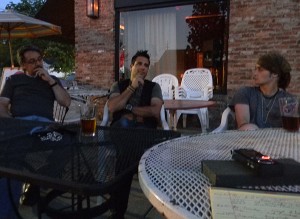
Rich spoke of the need to aggressively market yourself to find work in Nashville and how in his earliest days he obtained work by handing out demo cds of his drumming abilities to almost everyone he would meet around town. He candidly talked about those ‘lean years’, and that long before he was recording on hit records, touring the world with Jason Aldean, and producing acts like ‘Thompson Square’, he was hustling gigs on Broadway, playing in corporate party bands – whatever was necessary to insure survival.
For those who are just starting out in Nashville, he recommended that musicians “take every gig that’s offered”, as every new gig can potentially lead to new relationships and different career opportunities and that “If you give more to people then they expect, if you consistently exceed expectations, people are going to want to work with you.”
He spoke of the need to be ultra-professional by “always returning phone calls in a timely manner, always returning e-mails in a timely manner, being professional, being flexible, having the right gear to do the job and never mailing in a performance…”
Regarding the importance of reputation he said “You can have a great website, you can Tweet 1000 times a day, you can have a fantastic business card that’s got the really good paper, you know the really firm stuff that you have to pay extra for, and it’s still going to come down to word-of-mouth. In this [digital] age it’s so easy to be talked about in a positive or negative way, globally.”
During one part of the talk he mentioned a concept he refers to as “CRASH” a phrase he coined that stands for Commitment, Relationships, Attitude, Skill and Hunger – the five key ingredients he believes are necessary to succeed. He also spoke of the importance of defining your own success, a concept I talk about in my book “The Nashville Musician’s Survival Guide” (coincidentally, Rich contributed to the writing of this book).
After fielding several questions, he finished his talk and we all headed inside to make some music. Everyone who wanted to jam got a chance to sit in, and several great performances took place – ranging from classic rock covers to blues jams to originals. Rich stayed till the end making himself accessible to anyone who wanted to hang and chat, and during the middle of the jam he got behind the drum kit and played a few songs with me and several other alums. Here’s an MP3 of us playing a spirited version of the Jimi Hendrix classic, ‘Little Wing’
Audio clip: Adobe Flash Player (version 9 or above) is required to play this audio clip. Download the latest version here. You also need to have JavaScript enabled in your browser.
The night ended and we all headed home, but not until gathering for a group photo.
I want to thank everybody who came out and participated to make this another great event, see you at the next one! The next Nashville Berklee Jam will be held on Tuesday, July 10 – check back in a few days for info on the guest speaker for that night.
Stevie Ray Vaughan keyboardist, Reese Wynans talks at Nashville Berklee Jam
Some of my earliest childhood memories are of my dad playing records and, dare I say, reel to reel tapes of the music of Paul Butterfield, John Lee Hooker, Santana, and Derek and the Dominoes. I guess this music made an impression, because by my early teens in the early 1980’s I was buying my own records, not of the pop-based FM radio music of my generation, but of the previous generations more blues-based artists. While everyone else was listening to E.L.O. and Michael Jackson, I was discovering Jimi Hendrix, the Allman Brothers, BB King and Bobby Bland. Sure, I liked some of the 80’s guitar rock of the day, but always kept digging back to a more rootsy sound. Then right smack in the middle of 80’s hair band mania came Stevie Ray Vaughan, and I immediately related to his music.
Stevie’s music influenced a generation of guitarists and, at a moment where rock and pop music was winding itself up, almost single-handedly brought blues music back into the light. You couldn’t go see a club band during the late 80’s and early 90’s without hearing his music. I found myself covering his renditions of blues classics like “The Sky Is Cryin’”, “Empty Arms”, as well as originals like “Cold Shot” and “Walkin’ the Tightrope”, as did many others at that time. Stevie’s instrumental “Riviera Paradise” from the album ‘In Step’ is a beautiful piece of American roots music, and I always loved the spooky vibe created by his magical band on that song in particular.
I’ll never forget the day I heard of his tragic passing, how sad it was that we had to lose such a wonderful artist at such a young age. But his music, and the influence of his music, lives on, and I, like many others, will always appreciate everything Stevie did for music, and everything his music has done for the world.
So that’s why when I began hosting the Nashville Berklee Jam I felt compelled to 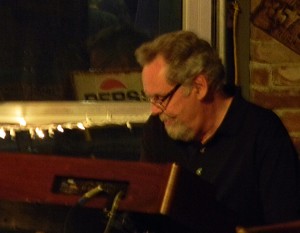 have Reese Wynans, the keyboardist who played with Stevie for the last five years of the great guitarist’s life, as a special guest speaker/performer. Reese was kind enough to share his story with me and a room full of alums at our monthly Nashville Berklee Jam last Tuesday at The Fillin’ Station.
have Reese Wynans, the keyboardist who played with Stevie for the last five years of the great guitarist’s life, as a special guest speaker/performer. Reese was kind enough to share his story with me and a room full of alums at our monthly Nashville Berklee Jam last Tuesday at The Fillin’ Station.
Almost 20 years before he began working with SRV he was playing in cover bands in his home state of Florida, and he recounted one of his first bands playing five sets a night, six nights a week. Two of the other members were Dickey Betts and Berry Oakley and on their one day off they would play a weekly free jam, adding Duane Allman and Butch Trucks to the mix. Eventually Duane decided to start his own band and stole these key members to form The Allman Brothers.
After spending a few years in San Francisco and working with a still-unknown artist at this time, Boz Scaggs, he returned to Florida for a brief period and then worked the East Coast in a show band for a few years. Reese then migrated to Austin, Texas, a booming town full of blues-infused music by this point of the mid-70s. Of this time, Reese spoke passionately.
“It was really great for me living in Austin…everything was so rootsy…they had a great music scene back there in the 70’s. They had a great blues scene, and a great blues club called ‘Antone’s’…and I would go and sit in at Antone’s anytime I had a chance. I was ending up really lovin’ the blues during this time.”
By 1980 he found himself working for Delbert McClinton, playing on four of his records and touring extensively for the next five years. By 1985, Reese was ready to get off the road, and would have if not for a fateful encounter at the end of his final gig with Delbert. Apparently, Delbert’s sax player had been invited to play on one song of a Stevie Ray Vaughan recording session after Delbert’s concert, and at the last minute Reese was asked to join in as the other keyboardist did not show up. Things went very well at this particular recording session, one which produced the hit, “Look at Little Sister” and Reese was asked to come back and record the following day. By the end of that recording session he was asked if he wanted to join the band. Reese summed up a life lesson from this critical moment,
“When a door opens for you, you’ve got to be willing to walk through it, and then be able to deliver once you get through there.”
The next five years would yield three Grammys, several world tours, and a reintroduction of the blues to the masses –
“We were spokesman for Texas blues…as much as Stevie didn’t want to, BB King had to open for us, because we were just more popular than him. He said “no we can never, BB’s always closing the show”… but finally, we had to headline…I loved playing in that band…we were all totally immersed in the blues, and we felt like were the vanguard of the blues. We were dragging Buddy Guy and Otis Rush into the light and presenting them out on our shows to people who were just hungry for that music…the stuff that we played I thought was shining a light on all the huge blues guitar players that had come before us, and that was a wonderful thing to do, I felt like it was really worthwhile.”
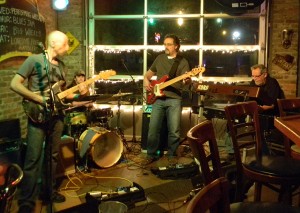 After Stevie’s tragic passing, Reese wound up in Nashville, TN, a place where he has continued to record and perform on a national level. During the talk, Reese passed around his All Music Discography, which reveals a staggering body of work, including Brooks and Dunn’s 2006 single of the year “Believe”. He offered us some thoughts about the differences between studio and live performance –
After Stevie’s tragic passing, Reese wound up in Nashville, TN, a place where he has continued to record and perform on a national level. During the talk, Reese passed around his All Music Discography, which reveals a staggering body of work, including Brooks and Dunn’s 2006 single of the year “Believe”. He offered us some thoughts about the differences between studio and live performance –
“I like being in the studio, I like playing gigs, I like playing clubs…all you people who do studio work know it’s two different things. Playing a club is really a chance to experiment…a chance to reach out in different directions and really find yourself. The studio isn’t really a place for that. The studio is where you don’t have to play it safe, but you’ve got to do something that’s exactly right for the 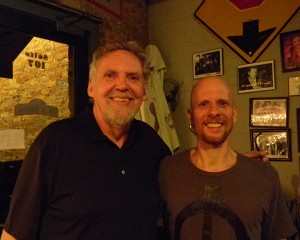 song…it’s a place for finding something that works, finding something unique that works.”
song…it’s a place for finding something that works, finding something unique that works.”
After his talk was finished, Reese was gracious enough to perform a set with our house band – a performance that was nothing short of inspired. I’ve heard his playing on many records, but there’s something intangible that you can feel in the heat of live performance that goes beyond a recording, and that was evident on this night. One of the songs we played together was “Little Wing”, a song that he had played on tour with Stevie, back in the day. On this song, Reese seemed to really stretch out in one of those magical musical moments in which time seems to stand still (see video below).
Eventually, this special night had to end, and we said goodbye after a quick photo op. Thanks, Reese, for sharing your wisdom, and for continuing to shine some light on that crown jewel of American music we call the blues.

